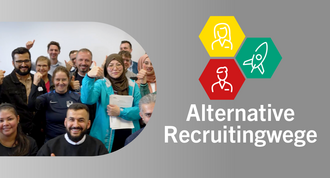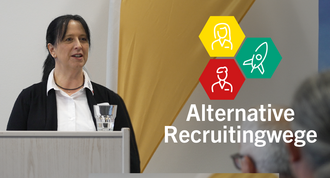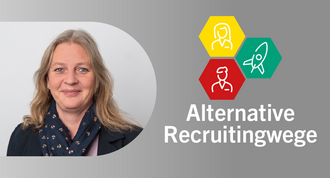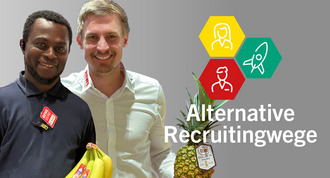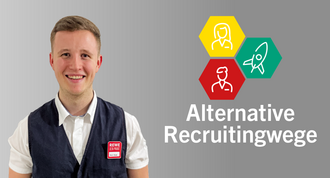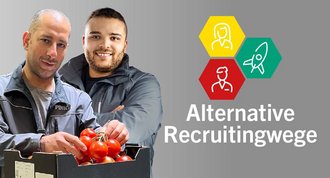
Stefan Fiévet, who is responsible for the recruiting team in the northern region, sees himself as a bridge builder: between job centres, local training providers, REWE Group stores and participants in the partial qualification programme. And he also has ideas on how to make the integration of new employees even more successful.
one: What should interested people without training who want to get back into work with the help of a partial qualification for sales activities in REWE or PENNY stores bring with them?
Stefan Fiévet: You have to be seriously motivated to go down this path. The best way to find out is in a personal interview. That's why we look less at the CVs of candidates recommended to us by job centres and instead invite interested parties to an introductory event. There, we also introduce ourselves as REWE or PENNY in detail, because after all, we also have to score points with the candidates as a potential employer.
one: Where can candidates for a partial qualification have deficits without this immediately leading to exclusion from the application process?
Stefan Fiévet: We are less strict when it comes to language skills because we know that we have partners at our side in the form of local job centres and training providers who help to reduce these deficits - for example, by integrating a job-related language course into the first module. We regard participants in the partial qualification programme as trainees. In other words, as a target group that needs to be given opportunities to try things out. This includes occasionally turning a blind eye if something doesn't go so well straight away.
one: What role do the training partners play?
Stefan Fiévet: On the one hand, they are knowledge brokers - not only in technical matters, but also when it comes to teaching people with a migration background the basics of the German labour market. For example, how to react in the event of incapacity for work or why punctuality and reliability are so important. On the other hand, the employees of the training centres are also mentors and coaches for the participants in the partial qualification. I have great respect for this work, because it is not easy to deal with people's private problems. It's very positive that the training partners, just like the job centres, don't sit back when faced with challenges and tell us that these are "our" candidates and we have to take care of them. Instead, we look for solutions together. After all, we have the same goal: to get people back into work.
one: Despite the good support, many participants drop out of the programme. Why is that?
Stefan Fiévet: Because of the highly competitive situation on the labour market, for example. If - as we are currently seeing - a company offers unskilled labour at a proud hourly wage of 15 euros, some people start to wonder whether it makes sense for them to complete the partial qualification, including attending the theoretical lessons and skills assessment. Other participants find it difficult to go back to school at an advanced age. And then there are also cases in which participants have dropped out of theoretical lessons because market managers have taken them on permanently after a short time due to their good performance. However, it is also true that we at REWE and PENNY need to become even better at integrating new employees into the stores.
one: What does that mean in concrete terms?
Stefan Fiévet: There is a lot to do in the stores and staffing is often tight. This sometimes leaves little time to closely support participants in the qualification programme and introduce them to their tasks step by step. This occasionally leads to frustration and excessive demands. In my view, it is also important to have a discussion about misdemeanours - such as unpunctuality - and explore the causes instead of issuing a warning straight away. These discussions are also supported by the socio-pedagogical support of the educational partners. But of course you can't wrap new employees in cotton wool and overlook all misdemeanours.
one: There is rarely time for intensive discussions in the hectic pace of the working day. How could integration be made more successful?
Stefan Fiévet: For example, by inviting not only district managers but also store managers and store employees to kick-off events on the topic of partial qualification at PENNY in future. After all, these are the people who will later ensure that the programme participants fit in well with the team on a day-to-day basis. Sponsorships may also help here: a store employee takes care of the worries and needs of a new colleague. And perhaps it also makes sense to define a kind of "onboarding store" in which all participants in a training programme receive the same training for four weeks - and only then start working in "their" store. All in all, we should have a little more courage to approach these people better in order to minimise the gaps in skilled sales staff. Even if it initially means a lot of effort for recruiting, HR, employees, store managers and retailers. We are investing in the future here!
Back to working life
The shortage of skilled labour is reflected in falling numbers of applicants. At the same time, there are around 1.5 million people who are unemployed and low-skilled, i.e. who have not completed vocational training. This is precisely where the Recruiting Centre's pilot project comes in: Together with the Federal Employment Agency, local job centres and educational partners, long-term unemployed and low-skilled workers are being trained for sales jobs in REWE and PENNY stores as part of a partial qualification (TQ).
We wanted to know from project participants how the project has helped them get back into work. We asked retailers, district managers, store managers and HR partners how it is helping them locally to combat the shortage of skilled labour. Employees from the Federal Employment Agency and training providers explain how they support the project. 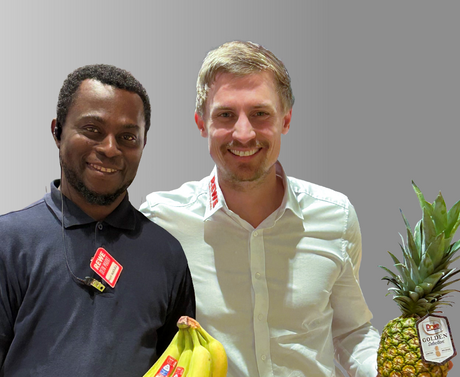 When it comes to finding employees for his store, REWE salesman Tim-Marlo Kaiser faces a particular challenge at the Wolfsburg site: he has to compete with Volkswagen. The car manufacturer is a sought-after employer in the region. In order to find reinforcements for his team, Kaiser decided to take a new approach to recruiting. As part of the partial qualification project, he hired Azuka Philip Ndihika, a trained banker from Nigeria, in June 2021. Today, the 49-year-old manages the store's fruit and vegetable department with two employees. Click here for the article.
When it comes to finding employees for his store, REWE salesman Tim-Marlo Kaiser faces a particular challenge at the Wolfsburg site: he has to compete with Volkswagen. The car manufacturer is a sought-after employer in the region. In order to find reinforcements for his team, Kaiser decided to take a new approach to recruiting. As part of the partial qualification project, he hired Azuka Philip Ndihika, a trained banker from Nigeria, in June 2021. Today, the 49-year-old manages the store's fruit and vegetable department with two employees. Click here for the article.


